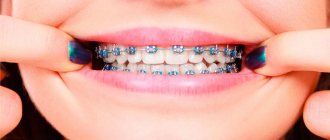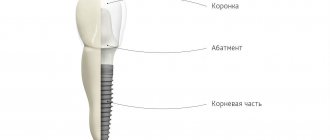Carrying out any surgical interventions in the area of the facial part of the skull, including dental procedures, is extremely dangerous due to the close location of important anatomical structures. When performing seemingly simple tasks during surgery, damage to atypically located nerves, vessels, and ducts of the salivary glands is possible, which leads to significant complications. Numbness after sinus lifting and bone grafting can appear at different stages of the operation and postoperative period; its causes can be very diverse and closely intertwined.
A little about the anatomy and course of the branches of the trigeminal nerve
The teeth of the upper and lower jaw are innervated by the branches of the trigeminal nerve, which provide all types of sensitivity directly to the teeth, skin and mucous membrane of the lips and cheeks. The lower jaw - by the mandibular nerve, the upper - by the alveolar branches of the maxillary nerve, forming the dental plexus.
The alveolar branches of the maxillary nerve pass along the wall of the maxillary sinus to the apexes of the roots of the upper teeth, where they form a nerve plexus responsible for the sensitivity of the upper teeth and gums. The mandibular nerve passes through the bone canal of the same name, innervating the lower teeth and gums, lower lip, and part of the cheek.
Literature:
- Guide to neurology according to Adams and Victor: textbook. manual for the postgraduate system. prof. physician education / Maurice Victor, Allan H. Ropper; scientific ed. V. A. Parfenov; lane from English edited by N. N. Yakhno. — 7th ed. — Moscow: Med. information agency, 2006. - 677 p.
- Peripheral nervous system in normal conditions and pathologies: educational manual / N. S. Subbotina; Federal Agency for Education, State. higher educational institution prof. Education Petrozavodsk State univ. - Petrozavodsk: PetrSU Publishing House, 2006. - 129 p.
- General medical practice according to John Nobel / S. Adhikari et al.; edited by J. Nobel, with the participation of G. Green and others; lane from English edited by E. R. Timofeeva, N. A. Fedorova; ed. trans.: N. G. Ivanova [and others]. — M.: Praktika, 2005.
Characteristics of sinus lifting and bone grafting
Bone grafting in dentistry is designed to increase the volume of bone tissue to create suitable conditions for placing a dental implant. An increase in the volume of hard tissues can be carried out both through the use of one’s own bone material and with the use of synthetic substitutes. Bone grafting is performed on both the lower jaw and the upper jaw.
Sinus lifting is an operation performed exclusively on the upper jaw and, in essence, is a type of bone grafting. Its task is to raise the bottom of the maxillary sinus in order to increase the volume of bone mass. Additional bone material can be either your own or artificial. There are two ways to perform a sinus lift: open and closed. They differ in the complexity of execution and the ability to add different amounts of bone tissue.
Dental implant placement should not be confused with bone grafting or sinus lifting. These are two different operations, although they can be performed simultaneously. If there is initially a small amount of bone tissue, it may not be possible to place a dental implant immediately. Then, first, bone tissue is built up, and only a few months later, an artificial tooth is implanted.
Vitamin and mineral deficiency
If the upper or lower jaw, as well as the lips, tongue and chin, go numb, then the reasons for this phenomenon may lie in an acute lack of B vitamins. With their deficiency, the conduction of nerve impulses is disrupted. To replenish the body’s “pantry” with B vitamins, you need to include foods such as nuts, beans, chicken, cheeses and cereals in your diet.
“My lower jaw constantly went numb during pregnancy. I complained to the doctor, but she said that this happens often. Pregnant women have metabolic disorders and slow blood flow, and they are always lacking vitamins and minerals. To correct the situation, I took all sorts of vitamins as prescribed by the doctor, had a massage, and tried to eat right. BUT nothing helped. I already began to suspect some serious abnormalities in my health, I donated blood, but the tests were normal. Everything went away a few weeks after giving birth!”
Alina I., review from babyblog.ru
Lack of vitamins also contributes to jaw numbness
Causes of numbness after surgery
It should be immediately mentioned that numbness associated with anesthesia will not be considered, since it is a normal reaction to the administration of the drug. Anesthesia can be maintained to one degree or another from several hours to a day, after which sensitivity returns in full and sometimes painful sensations of varying severity are observed. Also, a slight decrease in sensitivity may persist due to existing edema, which is a variant of the normal condition.
Severe loss of sensation occurs when the branches of the trigeminal nerve are damaged or compressed.
In what cases should you consult a doctor if you have numbness?
If the numbness has a physiological cause, that is, caused by a temporary disruption of the local blood supply, then it is enough to change the position and rub the numb area, and sensitivity will be restored. If the numbness does not go away, then the cause is more serious and you should consult a doctor.
It is necessary to get emergency medical help if numbness is accompanied by symptoms of damage to the central nervous system:
- headache, dizziness, attacks of weakness, double vision, loss of coordination;
- unexpected bowel movements or sudden urination;
- speech problems.
These symptoms may occur after a head, neck, or back injury.
You should also consult a doctor if:
- numbness occurs periodically and without an obvious reason;
- thermal perception is impaired (for example, the ability to distinguish between warm and cold water is impaired);
- Numbness is preceded by pain and loss of range of motion in one of the joints.
Problems in the lower jaw
Loss of sensitivity after bone grafting, like any other surgical interventions, is much more common in the lower jaw. This is due to the fact that during surgery, with an atypically high location of the mandibular canal or a small amount of bone tissue, nerve damage or compression may occur.
Nerve damage during surgery
Thanks to the widespread use of radiography and computed tomography, such a complication is now extremely rare. It may be associated with an atypical location of the mandibular canal, fragility of bone tissue, or medical error.
During the process of access, removal of tooth root debris, and formation of new bone tissue, the nerve may be damaged by the instrument or compressed by excessive amounts of new bone mass. In this case, after the end of anesthesia, numbness of the teeth anterior to the site of bone grafting, the lower lip, chin, and part of the cheek may persist.
Nerve compression due to implant displacement
If a dental implant changes its location due to injury, inflammation, or violation of medical instructions, compression of the mandibular nerve may occur. A similar situation can develop both in the first days and weeks after surgery, and after a long time.
With such a nerve trunk injury, extremely severe pain may initially be felt, and only then numbness may appear.
Nerve compression due to abnormal healing
After bone grafting, the slow process of new bone formation begins. Sometimes regenerative processes follow a pathological path, when newly formed tissues compress surrounding structures, blood vessels, and nerves.
This condition develops gradually, over 1-3 months after surgery. Numbness also does not appear immediately. Initially, it may be almost invisible or appear occasionally, passing after some time. Over time, numbness may increase or may remain at the same level.
Inflammatory process on the root of the tooth
If you are wondering why the lower jaw is numb, then the first thing you need to pay attention to is the condition of the oral cavity. An unpleasant symptom can be caused by dental diseases such as periodontitis and a cyst on the root of the tooth. Then, in addition to discomfort, a slight tingling sensation may be observed in the jaw and chin area, as well as pain when pressing or chewing food on the causative tooth.
The photo shows a cyst
Problems in the upper jaw
Numbness after sinus lifting and bone grafting in the area of the upper teeth and gums is less common than in the lower jaw. This is due to the fact that the innervation of these structures is carried out by three groups of branches of the maxillary nerve, intertwined with each other and forming the dental nerve plexus. Such a structure is quite difficult to damage or completely disable.
The loss of sensitivity in the area of the upper lip and upper half of the cheek cannot in any way be associated with dental interventions due to the fact that completely different branches of the maxillary nerve go to them.
Damage to the alveolar branches or dental plexus
This complication can only develop in conjunction with penetration into the maxillary sinus during surgery, which should not occur if the operation is performed correctly.
Local, mild numbness develops. One or two teeth may be involved with incomplete loss of sensitivity.
Improper placement of the implant or complications in the postoperative period
Dislocation of the skeleton of a prosthetic tooth can occur due to injury, inflammatory processes, or neglect of the dentist’s recommendations. Diagnosis of this condition is not particularly difficult due to the obvious pathological state of the implant.
There may be loss of sensitivity due to chronic odontogenic sinusitis. The condition develops over a long period of time, occurs with severe symptoms of sinusitis, and numbness develops in extremely severe and advanced cases.
Which doctor should I contact for numbness?
Numbness is a neurological symptom, so if you complain of numbness, you should consult a neurologist.
You must be prepared for the fact that a medical examination is only the first stage in solving the problem. Further instrumental studies will be required: MRI (for radicular syndrome), electroneurography, ultrasound (shows a picture of blood flow in the area under study), EEG (performed if diseases of the central nervous system are suspected). There may also be a need for laboratory tests (complete blood count, blood test for hormones, test for vitamins, etc.). Treatment for numbness is aimed, first of all, at eliminating the cause that caused it, that is, the disease whose symptom is numbness is subject to treatment. In some cases this may require considerable time.
If you are concerned about numbness in your fingers, arms or legs in general, or any other area of the body, contact the nearest clinic of JSC “Family Doctor”. Our neurologists will determine the cause of the numbness and prescribe adequate treatment. Therapeutic activities may include physiotherapy, physical therapy, massage, reflexology, manual therapy - this entire range of services is provided in the Family Doctor JSC network. Surgical treatment is carried out in the company's high-tech Hospital Center.
Diagnostics
If partial or complete numbness occurs after sinus lifting and bone grafting, you should undergo a number of diagnostic procedures:
- Examination of the oral cavity by a dentist. Allows you to assess the general situation and in some cases even make a diagnosis immediately. Must go through first. If there is displacement of the implant or nerve injury during surgery, then further examination methods can be of a purely clarifying nature.
- Assessment of neurological status based on damaged branches of the trigeminal nerve. This task is more likely for a neurologist, rather than for a dentist. By testing reflexes and using special methods to determine sensitivity, it is possible to assess the presence/absence of nerve damage.
- X-ray or computed tomography. These examination methods make it possible to establish in detail and accurately the cause of loss of sensitivity. With the use of modern technologies, it becomes possible to calculate down to the millimeter the direction and degree of displacement of the installed structure, existing pathological foci of regeneration, and determine the presence of an inflammatory process both at the site of bone grafting and directly in the maxillary sinus.
What to do if your lips go numb?
The treatment regimen depends on the cause that provoked paresthesia.
Recovery requires a comprehensive approach, including:
- taking medications;
- quitting smoking and alcoholic beverages;
- physiotherapy.
It is important to balance the diet, introduce foods rich in vitamins and minerals, and maintain a drinking regime, drinking at least 1.5 liters of water per day. Traditional methods are allowed as an auxiliary treatment.
Treatment with drugs
For diseases leading to numbness of the face and lips, different groups of drugs are prescribed.
| Group of drugs | Name | Action |
| Diuretics. | Lasix, Spironolactone, Bumetanide. | They relieve swelling, help regulate blood pressure, and help remove salt from the body. |
| Non-steroidal anti-inflammatory tablets. | Nurofen, Ibuprofen. | Reduce the inflammatory process, reduce the intensity of headaches. |
| Glucocorticosteroids. | Dexamethasone, Prednisolone. | They improve the conduction of nerve impulses and have antiallergic and immunosuppressive effects. |
| Antispasmodics. | Trental, Diprofen, Spasmalgon. | Relaxes vascular walls, improves blood circulation. |
| Nootropic drugs. | Piracetam, Nootropil. | They enhance metabolic processes in nerve cells and restore cerebral circulation. |
| Vitamin preparations. | Cyanocobalamin, Pyridoxine hydrochloride, Thiamine bromide. | Stimulate metabolism, prevent a lack of B vitamins, and normalize the functioning of the peripheral nervous system. |
| Vasodilator tablets | Vazonite. | Reduces viscosity, improves blood circulation, and ensures oxygen supply to tissues. |
Folk remedies for loss of sensitivity
- Take 1 tbsp. l. medicinal clover. Pour 500 ml of boiling water and let it brew for 20 minutes. Pass through a filter, divide into 3 doses and drink before meals. To prepare an infusion according to the same recipe, you can use geranium leaves, stinging nettle, and St. John's wort. Repeat treatment for 7 days.
- Dissolve 1 tsp in 200 ml of warm water. baking soda and add 4 drops of iodine. Stir, soak gauze in the product, fold it 3 times and apply to your lips for 30 minutes. Apply the lotions daily in the evening until the symptoms go away.
- Measure out 1 tsp. oak bark and chamomile. Brew the raw material in 200 ml of boiling water. After 15 minutes, strain and use for lotions 2 times a day.
- Peel the garlic cloves, chop and fill a 250 ml jar. Fill with vodka, seal with a plastic lid and place in a closet for a week. Shake contents regularly. Filter and take 5 drops 3 times a day, dissolving the tincture in 50 ml of water.
- Peel the pumpkin, cut into pieces, cover with water and simmer until tender. Drain the liquid, cool the vegetable slightly and blend with a blender. Apply warm to numb lips in the evenings for 20 minutes.
Physiotherapy for paresthesia
Physiotherapy is recommended to improve the passage of nerve impulses and blood circulation. The procedures activate metabolic processes, eliminate swelling and inflammation.
In the rehabilitation therapy of stroke, neuritis of the facial nerve, osteochondrosis of the cervical spine, the following are used:
- UHF to reduce swelling;
- electrophoresis with nicotinic acid, which dilates blood vessels;
- acupuncture to stimulate nerve endings;
- magnetic therapy to restore blood circulation;
- ultraphonophoresis with Proserin and Hydrocortisone.
Paraffin therapy helps a lot. Heated paraffin transfers heat deep into the tissues, dilates blood vessels and normalizes blood circulation. During the procedure, lips are lubricated with Vaseline. Heat the paraffin in a water bath to 60 degrees. Apply the product to the lips with a brush, cover with a napkin and apply several more layers. Insulate with polyethylene, cloth and leave for 30 minutes. Carefully remove the cooled paraffin and moisturize your lips with cream. For the procedure to provide a noticeable result, you need to undergo at least 10 sessions, which are done every other day.
Treatment options
If the nerve trunk, plexus or branches of the nerve are damaged or compressed, there are two ways to solve the problem.
The first is to leave everything as is, without performing surgery. Such a solution to the problem is acceptable in case of incomplete loss of sensitivity or a small area of focus, with the exception of cases with displacement of the denture. Compression of the nerve due to regenerative processes will stop progressing after a certain point, “frozen” in one place. Odontogenic sinusitis can be treated with medication using antibiotics.
The second method is to perform surgery. The operation is indicated for injuries during sinus lifting and bone grafting, displacement of dentures or bone mass, extensive or complete loss of sensation. During the operation, the cause of the numbness is eliminated and, if necessary, the damaged nerve is sutured. Restoration of sensitivity takes a long time, sometimes never returning to its original state.
Content:
- Causes of numbness
- Typical clinical picture
- Other symptoms
- Treatment
Alcohol in excessive quantities has a negative effect on all organs. The nervous system is also very sensitive to its effects - central (CNS), as well as peripheral. One of the consequences of this effect on the nerve structures is numbness after heavy drinking, which is felt in the hands.
At first it is insignificant, then it progresses - it causes discomfort and interferes with performing various types of work with your hands.
There is another side to the “coin”: such a feeling is not only unpleasant in itself, but can signal the possible development of a stroke.
Why do my hands go numb?
If your arms and legs go numb on one side, then most likely the cause is a stroke, transient ischemic attack, brain tumor or multiple sclerosis.
With a stroke, there are other symptoms: facial asymmetry, speech impairment, numbness of the limbs, muscle weakness. If you experience any of the above symptoms, you should immediately call an ambulance.
In a transient ischemic attack (TIA), a blood clot blocks a blood vessel in the brain for several minutes. This happens if the lumen is too narrow due to cholesterol plaques (atherosclerosis). Attacks occur regularly and are manifested by numbness of the arm, leg and/or face (mainly on one side), weakness, dizziness, double vision, and slow speech. The symptom complex depends on which vessel is affected.
Statistically, a third of people with a TIA will have a stroke, so such patients should definitely see a doctor to reduce their risks.
With multiple sclerosis, numbness of the face, limbs, and individual parts of the body is often the first symptom. Numbness can vary in strength, but sometimes it makes it significantly difficult to move an arm, leg, etc. There are no medications that can help cope with this condition. Despite the fact that the symptom may go away on its own, you should definitely seek help from a specialist as soon as possible.











